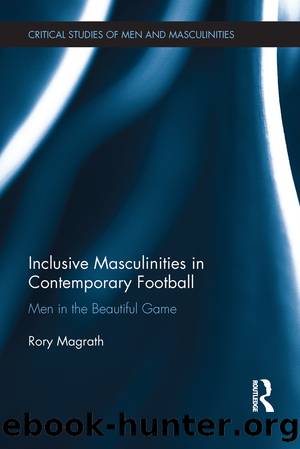Inclusive Masculinities in Contemporary Football by Rory Magrath

Author:Rory Magrath [Magrath, Rory]
Language: eng
Format: epub
Tags: Social Science, LGBTQ+ Studies, Gay Studies, Men's Studies, Sports & Recreation, General, Cultural & Social Aspects
ISBN: 9781317226741
Google: pgsxDQAAQBAJ
Publisher: Routledge
Published: 2016-10-04T06:03:41+00:00
Explaining decreased homophobia
Since the decriminalization of homosexuality in England and Wales in 1967 (Scotland, 1980 and Northern Ireland, 1982), polling data has shown that attitudes toward homosexuality have become increasingly liberal over time, albeit with the exception of the setback of HIV/AIDS in the mid-1980s (Clements & Field, 2014). However, as Keleher and Smith (2012, p. 1309) write, âObserving opinion trends is one thing; explaining them is another.â There are several influences which have contributed to the growing acceptance of the LGBT community over time: the media; the growth and development of the internet; the success of feminism; the success of gay and lesbian politics and increased number of gays and lesbians coming out of the closet (Anderson, 2009). It is also likely that recent legal gains, such as the passing of same-sex marriage in the UK, has had a positive effect on attitudes toward homosexuality (Weeks, 2007).
Keleher and Smithâs (2012) analysis offers three rationales to explain increased levels of tolerance. First, the lifecycle explanation incorporates a cohort shift in attitudes over time, claiming that as people age they become more conservative in their views. Social scientists during the 1950s and 1960s considered this to be a genuine possibility as they lacked attitudinal data to test the model (Keleher & Smith, 2012), although the General Social Survey has been asking questions about homosexuality since 1973. However, Schumunn, Steeh and Bobo (1985) and Mayer (1992) find limited evidence which supports this idea: aside from issues which explicitly affect oneâs lifeâsuch as income tax and welfareâcan be explained by the lifecycle explanation. Similar shortcomings are evident when this is applied to increased acceptance of homosexuality, rendering it, at best, an inconsistent explanation of the increased liberalizing of attitudes.
An alternative explanation for the shift to inclusivity is the generational-replacement rationale (Keleher & Smith, 2012). This rests on the assumption that attitudes do not alter over time, they are merely replaced with younger cohorts coming of age. This is used by Keleher and Smith (2012) to evidence the increase in education throughout the twentieth century, which resulted in well-educated Americans replacing poorly-educated older generations, in turn causing the average level of education to rise. Applying this to attitudes to homosexuality, Keleher and Smith (2012) find that generational-replacement has some impact, 21â40 percent, which accounts for a substantial, yet not complete explanation. Simultaneously, generational change is a slow process, and cannot solely account for the dramatic increase of acceptance since 2000 (Loftus, 2001). Significantly, however, this explanation would support a number of scholars who show that decreasing homophobia is a strong trend across young male adolescents both in the US and the UK (Anderson, 2009; Anderson et al., 2016; McCormack, 2012; McCormack & Anderson, 2014b; Roberts, 2013).
While social scientists typically rely on the lifecycle explanation and generational-replacement explanation account for changes in public opinion, the period-effects rationale refers to anything left overârelating to causes of opinion which affects all cohorts at the same time, causing a general shift in public opinion in the same direction (Keleher & Smith, 2012).
Download
This site does not store any files on its server. We only index and link to content provided by other sites. Please contact the content providers to delete copyright contents if any and email us, we'll remove relevant links or contents immediately.
The Inner Game of Tennis by W. Timothy Gallwey(3679)
Unstoppable by Maria Sharapova(3523)
Crazy Is My Superpower by A.J. Mendez Brooks(3398)
Urban Outlaw by Magnus Walker(3392)
Mind Fuck by Manna Francis(3176)
The Social Psychology of Inequality by Unknown(3018)
The Fight by Norman Mailer(2927)
Unstoppable: My Life So Far by Maria Sharapova(2500)
Accepted by Pat Patterson(2364)
Going Long by Editors of Runner's World(2356)
Futebol by Alex Bellos(2354)
Sea Survival Handbook by Keith Colwell(2241)
Backpacker the Complete Guide to Backpacking by Backpacker Magazine(2241)
The Happy Runner by David Roche(2233)
Motorcycle Man by Kristen Ashley(2231)
The Sports Gene: Inside the Science of Extraordinary Athletic Performance by David Epstein(2173)
Peak: Secrets from the New Science of Expertise by Anders Ericsson & Robert Pool(2031)
Endure by Alex Hutchinson(2019)
The Call of Everest by Conrad Anker(1907)
